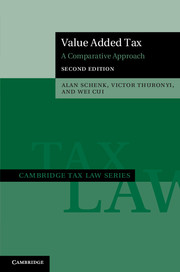Book contents
- Frontmatter
- Dedication
- Contents
- List of Tables and Charts
- List of Cases
- Preface to the Second Edition
- 1 Introduction
- 2 Consumption Tax Forms and Base Alterations
- 3 Varieties of VAT in Use
- 4 Registration, Taxpayer, and Taxable Activity
- 5 Taxable Supplies and Tax Invoices
- 6 The Tax Credit Mechanism
- 7 Introduction to Cross-Border Aspects of VAT
- 8 Timing and Valuation Rules
- 9 Zero-Rating, Exemptions, and Exempt Entities
- 10 VAT Evasion and Avoidance
- 11 Gambling and Financial Services (Other than Insurance)
- 12 Insurance
- 13 Real Property
- 14 An Anatomy of the Chinese VAT
- 15 Interjurisdictional Aspects
- Appendix VATs Worldwide
- Index
- References
9 - Zero-Rating, Exemptions, and Exempt Entities
Published online by Cambridge University Press: 05 February 2015
- Frontmatter
- Dedication
- Contents
- List of Tables and Charts
- List of Cases
- Preface to the Second Edition
- 1 Introduction
- 2 Consumption Tax Forms and Base Alterations
- 3 Varieties of VAT in Use
- 4 Registration, Taxpayer, and Taxable Activity
- 5 Taxable Supplies and Tax Invoices
- 6 The Tax Credit Mechanism
- 7 Introduction to Cross-Border Aspects of VAT
- 8 Timing and Valuation Rules
- 9 Zero-Rating, Exemptions, and Exempt Entities
- 10 VAT Evasion and Avoidance
- 11 Gambling and Financial Services (Other than Insurance)
- 12 Insurance
- 13 Real Property
- 14 An Anatomy of the Chinese VAT
- 15 Interjurisdictional Aspects
- Appendix VATs Worldwide
- Index
- References
Summary
Introduction
This chapter covers exemptions and zero-rating. As discussed in more detail in Chapter 2, an exemption may be an “item” exemption limited to particular supplies of goods or services or an “entity” exemption applicable to all or most supplies by a particular kind of entity. Zero-rating generally is provided for exports of goods (regardless of the nature of the goods exported) and exports of some services. In the case of supplies by a unit of government or nonprofit organization, an exemption may be provided for all supplies, restricted to certain supplies on the basis of the nature of the goods or services supplied, or provided for all supplies except those that compete with the private sector.
The next two parts of this chapter cover zero-rating and exemptions, with attention focused on the complexity resulting from borderline cases involving “item” exemptions or “item” zero-rating. Sections IV and V discuss cases in which two or more items with different VAT consequences are bundled to obtain the desired tax treatment and A-B-C transactions in which an upstream supplier wants to integrate its supply with a downstream supply to obtain the VAT treatment of the downstream supply. Section VI of this chapter discusses some of the special VAT problems associated with the nonprofit and governmental sectors and proposals to include more services by these sectors in the VAT base.
- Type
- Chapter
- Information
- Value Added TaxA Comparative Approach, pp. 260 - 310Publisher: Cambridge University PressPrint publication year: 2015

